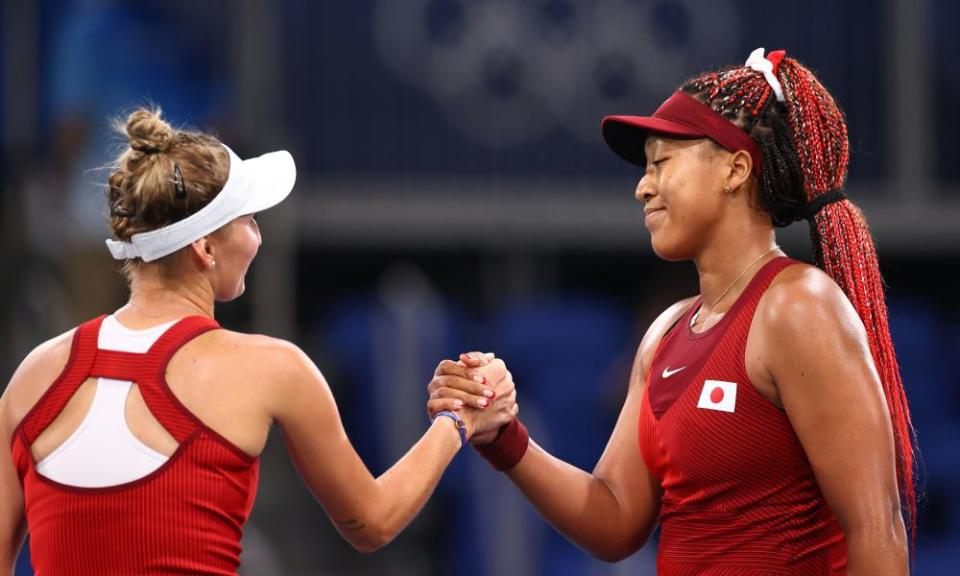Naomi Osaka stunned as face of Tokyo Games knocked out of Olympic tennis

For a short moment deep in the second set of what was to be the most crushing loss of her year, it seemed like Naomi Osaka may just have been able to tap into the resolve that has served her so well in her career. Down a set and serving to stay in the Olympics, she saved consecutive match points, one with a blazing forehand winner, and crept up to a point within a momentum-swinging hold of serve.
But as was the case throughout a tough, lethargic day on the court, the resolve was not present. The mental tank was dry. She ended the match soon after with two of her many backhand errors throughout the day as her dreams of winning an Olympic gold medal on her home soil in Japan came to a crashing end. She was defeated 6-1, 6-4 by the Czech Republic’s Marketa Vondrousova.
Related: Everyone loves Novak: how Djokovic became a star in the Olympic village | Tumaini Carayol
Perhaps under regular circumstances, as regular as being seen as the face of the Olympics can be, this may have ended differently. But in addition to all the pressure that has been building since the beginning of the year and even longer, the type of pressure that Osaka has thrived on in the past, it also came in the wake of her decision to to withdraw from the French Open and Wimbledon in order to prioritise her mental health.
Even as she retreated back to the United States after her decision to skip press conferences in Paris led to a mass of attention and criticism, the noise was deafening. The pressure cooker of the Olympics was no help. Her loss seemed like the consequences of all of those stressors combined.
After this defeat, Osaka left the court by a side exit instead of walking through the mixed zone directly outside of the stadium court as players are required to, even if they choose not to stop and speak with the media. The initial word was that she was not returning. According to Tokyo Sports, the Japanese Tennis Federation stepped in and convinced Osaka to return.
“I mean yes and no,” said Osaka after being asked if she felt the pressure was too difficult to handle. “I feel like I should be used to it by now. But at the same time, the scale of everything has been a bit hard because of the break that I took. I am glad I didn’t lose in the first round at least.”
From the beginning, Osaka was off. She opened the match by spraying wild forehand errors as she struggled to put the ball into the court. She fell down 4-0 in a flash. As the unforced errors continued to pile up, Vondrousova took the first set 6-1.
An immediate response was needed and for a while it seemed to be brewing. Osaka opened the second set with a break behind some efficient serving and authoritative ball striking, establishing a quick break in the second set for a 2-0 lead. But through the encounter, Vondrousova soaked up pressure from Osaka’s first strike and she slowly pulled her in. Osaka double faulted to give up the break. Both players held serve until 5-4 in the second set until, under the glare of the scoreboard as she served to stay in the match, Osaka blinked.
The pressure resting on Osaka did not go unnoticed by her 21-year-old opponent, who used that knowledge to play freely. “I think for her, it’s tough to play in Japan also, Olympics,” said Vondrousova. “I knew that I’m not under pressure.”
It’s so much pressure I cannot imagine,” Vondrousova added. “I know how it is to be under pressure, it’s tough. I think she didn’t play a bad match. She was fighting the whole match, she was staying calm and I think she was fighting to the end.”
As attention rests on the fallen star, the victor so often is forgotten. But such a convincing result was not possible without an excellent performance from Vondrousova, an extremely capable and talented young player who reached the French Open final in 2019 aged 19 and was ranked in the top 20 until earlier this year. Throughout the match, Vondousova neutralised Osaka’s serve and made her uncomfortable with a slew of delicate drop shots.
During the Japanese section of her press conference, one reporter asked Osaka how she was. Tears welled in her eyes and she could not respond. Her year had been leading up to this and now it is done.
The next step for Osaka remains unknown. She says that she does not know when she will compete next once the sting begins to wear off: “I am a person who wings a lot of things. That is either a really good thing or a really bad thing.”
What separates tennis from the majority of other sports being played in Tokyo this year is that it provides opportunities for redemption. That moment will surely come eventually, but Osaka will never have another chance to win her home Olympics.

 Yahoo Sport
Yahoo Sport 





































